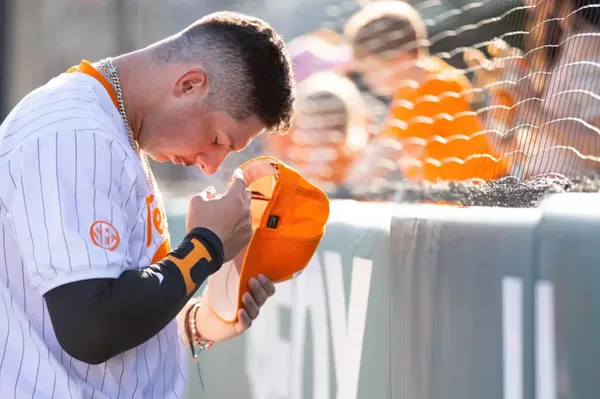

Have you ever thought about how it feels when you put in all the hard work, hoping it will pay off, only to find that it hasn’t gone the way you expected? That’s exactly what might be going on in the mind of Alberto Osuna, who remains ineligible to play college baseball. After the federal judge rejected Osuna’s request for a preliminary injunction, his hopes of playing for Tennessee, the reigning College World Series champions, were abruptly dashed.
On being denied the opportunity to play for the Vols, Osuna’s lawyer, Chad Hatmaker, made a statement to Knox News on April 28, saying, “Alberto is extremely disappointed with the decision. We are weighing our options before deciding on our next steps.” That pretty much says it all! Osuna’s second attempt was also turned down, and it is unlikely that he will be able to play in Division I again. So, what’s stopping the Tennessee Star from playing college baseball?
Before relocating to North Carolina, where he has been a starter for the North Carolina Tar Heels baseball team for the past three seasons (2022-24), Osuna spent the entire 2020 and 2021 seasons at Walters State Community College in Morristown, Tennessee. Osuna, however, made an effort to obtain eligibility to play collegiate baseball after moving back to Tennessee. He did this because he believed that he was no longer Division 1 eligible after playing in North Carolina. Owing to this, he moved to the Division 2 programme in Tampa. Osuna even filed a lawsuit against the NCAA, arguing that his time at Walters State should not be taken into account when determining his eligibility to play collegiate baseball.
ADVERTISEMENT
Article continues below this ad
He expected something similar to what happened with Vanderbilt quarterback Diego Pavia and Jett Elad, who gained eligibility on similar grounds. For the unversed, Elad, who transferred to Rutgers from UNLV, previously played at Garden City Community College (JUCO) in 2022. He successfully argued that his JUCO season should not count against his NCAA eligibility—a similar case to that of Pavia. Despite having the same expert witness as Pavia and Elad, Osuna was the only one whose motion for an injunction was denied.
However, his option was rejected by U.S. District Judge Charles Atchley last month, who said, “The Court is sympathetic to Plaintiff’s position. For an organization that professes to prioritize the well-being of its student-athletes, the NCAA’s conduct has in many ways been questionable at best and self-interested at worst. Still, Plaintiff’s extraordinary talents cannot alone justify the extraordinary remedy he seeks.” The district judge mentioned that the impressive skills and abilities alone cannot justify the outcome that he expects.
In essence, the Sherman Act is violated by NCAA regulations, which keep athletes from entering the free market. The primary reason is that if a player attends junior colleges while not eligible for Division 1, they will not be able to take advantage of the opportunities and benefits available to them during their four years in the programme. And that’s the reason the Tennessee star cannot play college baseball.
Osuna had a good record as a three-year starter for North Carolina. Over the course of his three seasons as a player, Osuna recorded 32 doubles, 45 home runs, and 140 RBIs while working as a designated hitter and first baseman. His batting average was .259.

What’s your perspective on:
Why does Diego Pavia get a pass while Osuna is left in the dugout? Fair or foul?
Have an interesting take?
Osuna had a good record as a three-year starter for North Carolina. Over the course of his three seasons as a player, Osuna recorded 32 doubles, 45 home runs, and 140 RBIs while working as a designated hitter and first baseman. His batting average was .259. However, his hopes to play D1 baseball are looking grim. But then the question arises, how come a similar case involving Diego Pavia gained precedence? Let’s see!
Why is Diego Pavia allowed to play a season despite being on the same grounds as Osuna?
That’s certainly a big question to answer. But there’s a reason that the Vanderbilt quarterback has managed to win the injunction, which Osuna couldn’t, enabling him to play another season. However, the district judge in this instance made it clear that Pavia’s time at the junior college should not be taken into account when determining his eligibility. Pavia used to lead the New Mexico Military Institute and also played at New Mexico State from 2022 to 2023 before getting transferred to Vanderbilt, where he won.
But how come he managed to win the injunction?
Specifically, players were permitted to participate in the 2025–2026 season due to a waiver granted by the NCAA. Players who played for more than a year at a non-NCAA school were essentially eligible for this type of waiver, though it also depended on other factors like their degree progress and five-year eligibility period. But there’s a problem.
ADVERTISEMENT
Article continues below this ad

ADVERTISEMENT
Article continues below this ad
Since baseball is a spring sport and the upcoming season will not occur during the 2025–2026 academic year, this type of waiver essentially has no value. Osuna suffered the most from this rule, but Diego Pavia benefited greatly from it. He contested the NCAA’s eligibility requirements. As anticipated, during the hearing, the district judge invoked the rules that violated antitrust laws by weighing junior college eligibility against Division 1 eligibility, ultimately allowing Pavia to play. Do you think that the judge has been a bit harsh on Alberto Osuna, or was it his own mistake that cost him the most?
ADVERTISEMENT
ADVERTISEMENT
ADVERTISEMENT
ADVERTISEMENT


"Why does Diego Pavia get a pass while Osuna is left in the dugout? Fair or foul?"